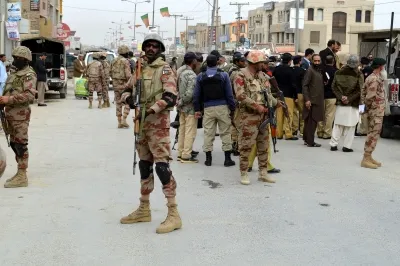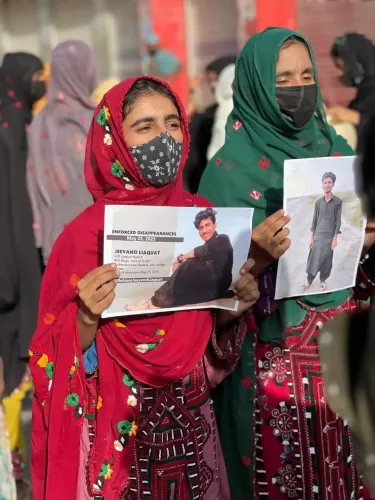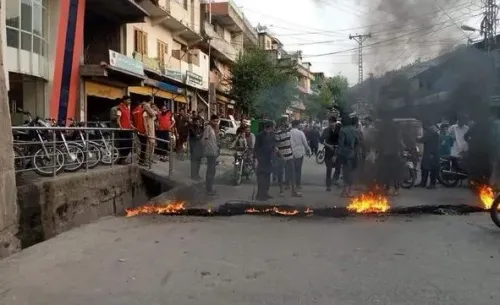Why Does the Pakistani Army's Human Rights Record Raise Concerns?

Synopsis
Key Takeaways
- Serious human rights violations reported against the Pakistani Army.
- 2,332 enforced disappearances documented in 2024.
- Military courts have expanded their jurisdiction since 2015.
- Authorities granted sweeping powers to detain activists.
- Ethnic minorities face disproportionate targeting.
Athens, Aug 31 (NationPress) The human rights practices of the Pakistani Army continue to raise serious alarms among global organizations and advocacy groups. Allegations include arbitrary and unlawful killings, extrajudicial executions, enforced disappearances, and widespread torture across all regions, according to a recent report.
The Pakistan-based organization, Defence of Human Rights, has documented 2,332 instances of enforced disappearances in 2024, indicating a disturbing trend and increase in abductions associated with state actors, as reported by Greece-based Geopolitico. The United Nations Working Group on Enforced and Involuntary Disappearances noted a 27% rise in such cases since the previous period, with 934 cases pending resolution as of May 2024.
The Geopolitico report states, "The human rights record of the Pakistan Army is cause for grave concern among international organizations and rights advocates. Allegations of unlawful killings, enforced disappearances, extrajudicial executions, and extensive torture are frequently attributed to the military across multiple provinces, particularly in Balochistan, Sindh, Punjab, and Khyber Pakhtunkhwa. Human rights organizations, mirroring findings from the US Department of State, continue to report numerous instances of 'kill and dump' policies that implicate the Army and security agencies in the abduction, torture, and assassination of dissenters with near-total impunity.
The Baloch National Movement’s human rights wing, Paank, recorded 28 cases of torture, five extrajudicial killings, and 33 enforced disappearances in February 2024.
The report also highlighted that the Awaran district witnessed the highest incidence of these human rights abuses, indicating systematic targeting. The military's brutality extended to peaceful protesters and political activists. The Amnesty International report for 2024 sheds light on the killings and injuries of demonstrators, implicating law enforcement, including the Army. In July, three individuals lost their lives during a Baloch national gathering, while police opened fire on rallies in Islamabad and Bannu, leading to numerous casualties. Events from May 2023 saw 85 protest participants detained by military courts, remaining imprisoned after secret trials, raising concerns over violations of fair trial rights and civil liberties.
The reputation of Pakistan’s military and intelligence establishments is marred by excessive violence. Reports from Amnesty International and the UN Human Rights Committee have linked mistreatment, extrajudicial killings, and widespread torture to military operations, particularly in Balochistan. Victims include not only suspected militants but also civilians, such as students, journalists, activists, and politicians, as detailed in the Geopolitico report.
Female activists have reported instances of sexual violence and assault during detention, with no accountability for the perpetrators. According to Paank’s 2024 report, civilians are forcibly abducted from their homes, schools, and public spaces, only to be held in torture cells.
The report further stated, "Concerns regarding military courts have escalated, especially since 2015, when their jurisdiction expanded significantly. The 2024 Amnesty International review asserts that the application of military courts for civilians, especially in political cases, infringes upon fundamental rights to liberty and fair trial. Of the 105 individuals tried in military courts following the protests on May 9, 2023, twenty were released as of March 2024, while 85 received sentences ranging from two to ten years. These trials were conducted in secrecy, heightening distrust within civil society."
The 'Peaceful Assembly and Public Order Act 2024' and similar laws enacted in various provinces grant extensive powers to authorities, including the Army, to detain and restrict activists without judicial review. Section 144 of the Code of Criminal Procedure is frequently applied to prohibit gatherings.
The report noted, "The Army’s actions disproportionately impact Baloch, Pashtun, and other ethnic minorities. UN experts in April 2025 pointed out that Pakistan’s counter-terrorism strategies conflate legitimate advocacy for minority rights and peaceful protests with terrorism, endangering fundamental freedoms. Baloch activists, already facing enforced disappearances and extrajudicial killings, have experienced arbitrary arrests and collective punishment during peaceful demonstrations. Numerous bodies found in Balochistan exhibited signs of torture and prolonged detention before death, as reported by international media."
Places of worship belonging to minority faiths, particularly the Ahmadiyya and Christian communities, have faced desecration, while violence and unlawful killings associated with blasphemy laws by security forces persist without substantial accountability, as stated in the Geopolitico report.
"Evidence compiled from credible international sources reveals a pattern of brutality, systematic rights violations, and widespread military impunity within Pakistan’s security forces, particularly the Army. The high incidence of enforced disappearances, extrajudicial killings, torture, and arbitrary detentions in 2025 reflects a grim reality for a force whose operations frequently violate international human rights standards. Absent significant reform, independent investigations, and judicial accountability, these abuses will likely persist, exacerbating both domestic and international apprehensions regarding Pakistan’s commitment to the rule of law and fundamental rights."









